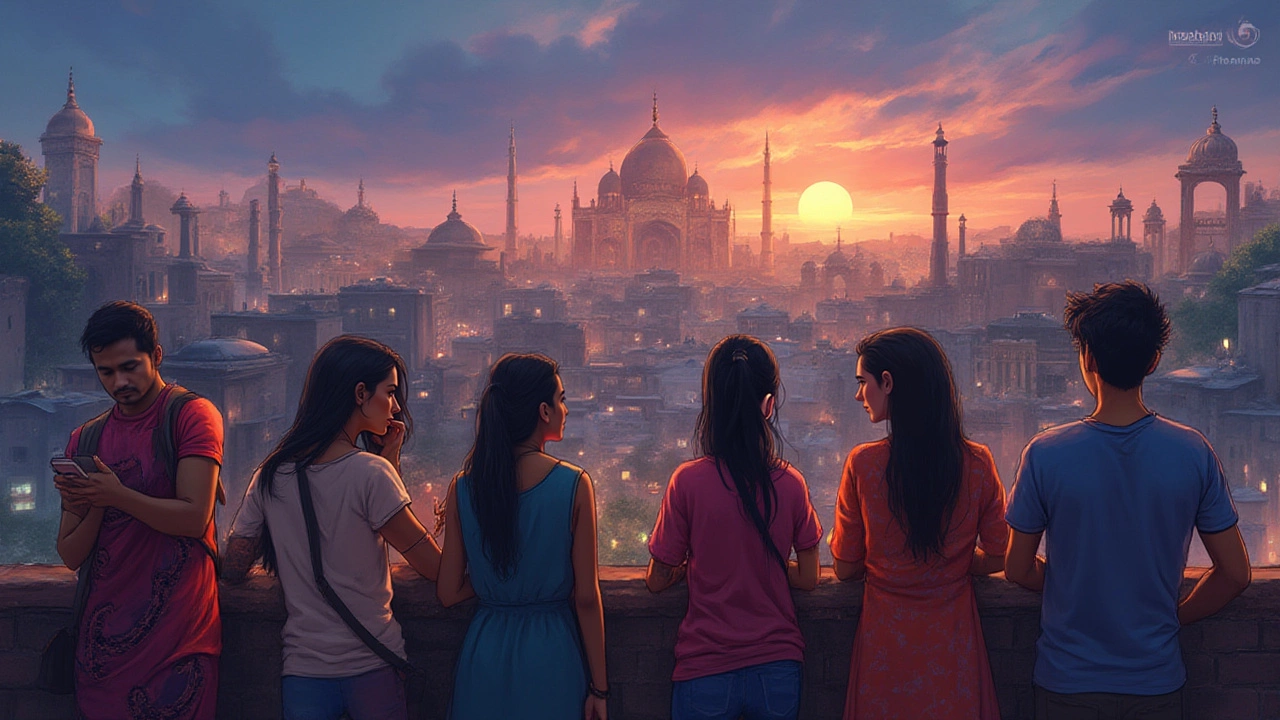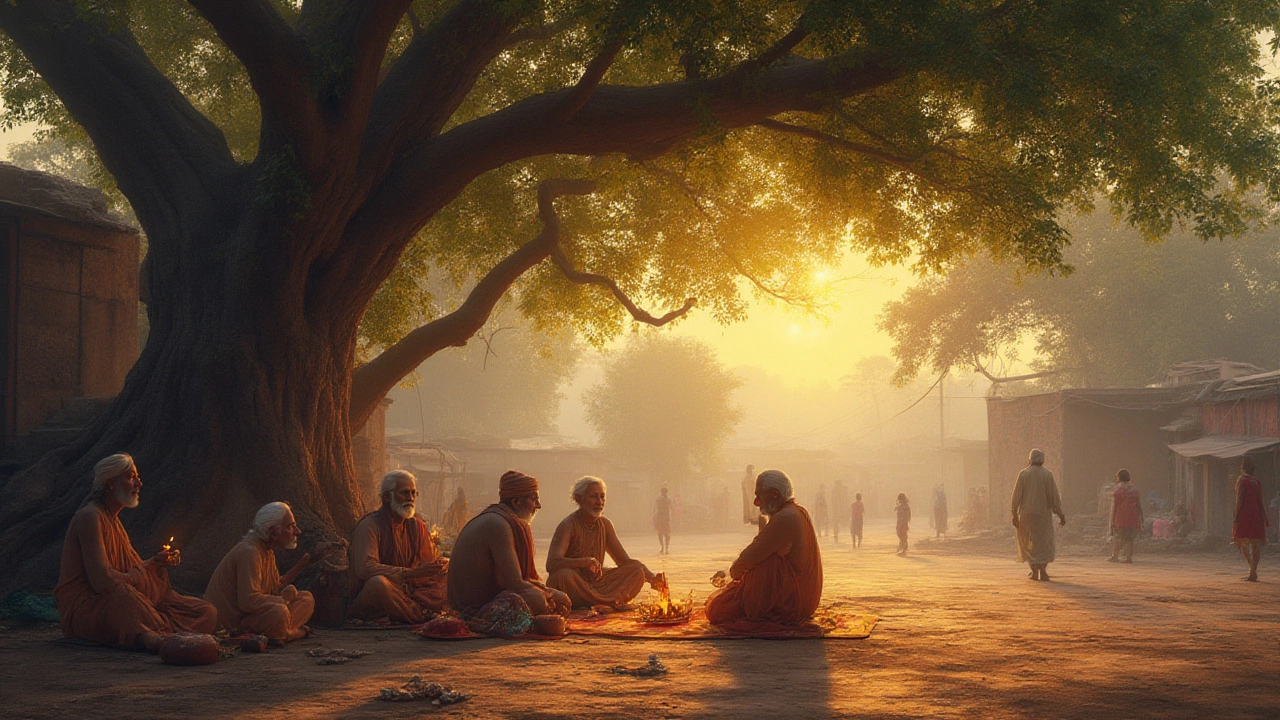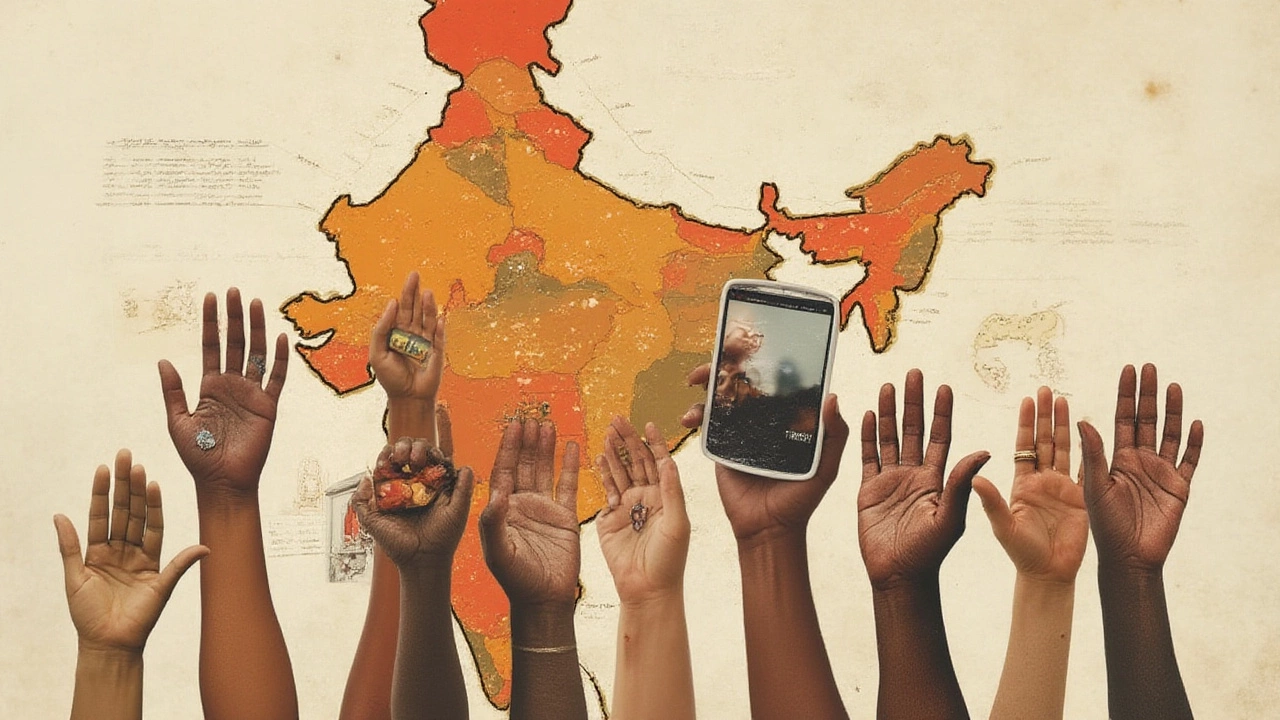Does India Believe in God? Faith, Facts, and the Indian Mindset Explored
 Jul, 4 2025
Jul, 4 2025
The chai was piping hot and the rain drummed hard on the car roof while I waited for Aarav outside his cricket class. Suddenly, a question struck me: does this country, for all its diversity and noise, really believe in God? If you ask my mother, she’d say yes without blinking; my son would give me a look like I’d just asked if Wi-Fi runs on magic. Yet, walk down any street and you’ll see a hundred tiny shrines, smell incense, and bump into someone talking about karma. So, let's unpack what belief looks like in modern India — beyond just ceremonies and statistics.
Faith In The Numbers: What Does the Data Say?
If you went by temple bells and Friday prayers, you’d think everyone here is deeply religious. And the numbers seem to back that up — at first glance. According to the 2021 Pew Research Center study on religion in India, a whopping 97% of Indians say they believe in God.
But the story doesn’t end there. That faith looks different when you break it down by age, city versus village, and even education. Older Indians — those above 50 — are almost universally believers. But about 11% of Indians under 25 say they’re unsure or don’t believe in any god at all. This gap widens further in major cities like Bengaluru, Mumbai, and Delhi, which are teeming with young professionals and students who treat temple visits like any other outing — optional, maybe even old-fashioned.
And the shape of belief has changed: The same Pew survey showed that among people who called themselves Hindus (around 80% of the population), just under half said they believe in “God as described in religious texts.” Another 40% said they believe in “some other higher power.” So it’s not just a tick box: people are picking and choosing their own versions of faith.
| Belief | Urban (%) | Rural (%) |
|---|---|---|
| Believe in God | 92 | 99 |
| Atheist/No Belief | 6 | 0.8 |
| Uncertain/No Answer | 2 | 0.2 |
Still, it’s obvious: the idea of God — or at least something bigger — sits in the background of almost every conversation about fate, luck, or even cricket scores. Maybe that’s why the question “does India believe in God?” isn’t about statistics, but who’s actually making the rules up there and how we talk about that in daily life.
The Many Faces of God in the Indian Imagination
The real fun starts when you realize that belief in God here looks nothing like a monochrome wall of faith. Walk through Varanasi at dawn and it feels like every stone, river splash, and bird call is a prayer. Flip to Kerala, where church bells and muezzins mix with temple drums, and you see God as a constant companion — just with many names.
But don’t picture everything as a ritual. For a lot of urban families — like mine — faith is more private. Lighting a diya at home, whispering "please, God" before an exam, blaming “bad karma” when stuck in traffic, or visiting a gurudwara before moving cities: all ways belief sneaks into daily choices. When I talk to Aarav’s friends, some say “I don’t really believe, but I still go for Ganpati Visarjan because it’s fun and it matters to the family.”
Some will say India is unique because you find public godlessness too: the incredible story of Periyar in Tamil Nadu, for example, who led the Dravidian atheist movement a century ago. Still, these people aren’t the norm, but they do shape local cultures. Even the word for “atheist” here — nastik — comes from Sanskrit debates older than most nations. While fewer than 1% of the population openly calls themselves atheist or agnostic, the presence is there, loud and uncompromising in pockets like Jawaharlal Nehru University or certain artistic circles. Sometimes, the gods you “don’t believe in” shape you as much as the ones you do.
What’s fascinating is that for most Indians, the line between belief and non-belief isn’t black and white. It’s perfectly normal for someone to visit a mosque and a temple, or to pray extra during an exam and skip every other ritual all year. Nobody bats an eyelid when you mix “aum” with “Allah” in a WhatsApp forward. God, for India, is more like a playlist than a single artist — you listen when and how you want, and you’re rarely forced to pick one channel for life.

Tradition vs. Modernity: How the Young See God Now
If I look at the difference between my own upbringing and Aarav’s, the change is striking. I grew up with weekly temple visits, annual yagnas, and “don’t question elders.” Aarav lives with Alexa, streaming mythological stories and binge-watching Sadhguru clips — if he chooses to look up spirituality at all.
The 2023 India Today Mood of the Nation survey picked up on this: only 67% of urban 18-25-year-olds agreed with the statement, “God is essential to be a good human.” Compare that to 95% among those aged 50+. When you walk into an office, you’ll see more people sharing Sufi poetry than asking for puja laddoos. Yet, during exams or heartbreak, temples and churches see big crowds — it’s almost like faith is a backup plan for when logic and hustle stop working.
At the same time, access to the internet has flooded younger Indians with more questions than answers. It’s not unusual for teenagers to be reading Bible verses and quantum physics side by side — sometimes questioning, sometimes searching for overlap. But that doesn’t mean faith has vanished. It simply looks different: less about ceremonies, more about meaning. When Aarav and his friends discuss fate or the universe, half the group’s argument is straight out of TED Talks on spirituality in Silicon Valley, not their great-grandmother’s prayer room. In a sense, the Indian approach is to keep the door open — belief isn’t about ticking a box, but having the freedom to say “maybe,” “sometimes,” or “depends.”
This search for something bigger isn’t restricted to traditional religion either. Yoga isn’t just a set of stretches here — it’s sometimes a whole spiritual identity. Mindfulness apps, astrology memes, and spiritual influencers are reinventing how belief is packaged, even as old structures fade. It’s cool, yet very Indian: to seek God — or something like God — within yourself, guided by old texts, YouTube playlists, and maybe even a lucky jersey.
Faith In Public Life: Festivals, Politics, and the News
Step outside, and it’s impossible to miss the public face of faith in India. The Republic Day parade kicks off with a prayer, and so does most government work, even technical launches in ISRO. Cricket captains talk about God in post-match interviews; politicians wrap every speech in blessings. Even Bollywood jumps in — waving to temples, visiting dargahs, and occasionally turning religious festivals into blockbuster events. Did you know, during Diwali, India burns about $1.3 billion worth of firecrackers, almost all bought in the name of tradition?
Yet, beyond the noise, faith is also a source of tension. You see it in noisy debates on TV, and sometimes in the bitter arguments at the dinner table. The line between faith and politics blurs easily, especially in election season. This isn’t just a new trend: religion and power have been linked since ancient empires and Mughal courts. But technology — especially WhatsApp and Twitter — is now amplifying it to a new level.
Festivals offer a peek into just how public belief really is. Holi, Eid, Christmas, and Pongal are celebrated in the open, and you don’t need to belong to the faith to join in. “Nobody celebrates with as much noise as Indians,” British anthropologist David Frawley once joked. But along with celebration comes pressure: to belong, to participate, or to stay away if you don’t share the faith. The tension between personal belief and public expectation is real — as visible in election rallies as in neighborhood WhatsApp group fights.
There’s a flip side too: community kitchens at Gurdwaras feed thousands during every festival, regardless of belief. Religious charities quietly run hospitals, orphanages, and schools — sometimes bridging gaps the government can’t. These acts rarely make headlines but reveal a side of Indian faith that’s more practical than philosophical.
“Religion is not just a personal matter in India — it is a public phenomenon, negotiated in the open and in the company of others” — Dr. Amrita Narayanan, public intellectual

Finding Faith — Or Not: Navigating Belief In Everyday Life
For every friend who swears by Ganpati’s blessings, there’s another who calls it all superstition. But Indians are world champions at mixing tradition and modernity, belief and doubt. I remember a family friend, Priya, an orthopedic surgeon: she prays before every surgery, but keeps a Bhagavad Gita on her bookshelf, next to her collection of scientific journals. "I’m not sure about God, but I’m grateful to something bigger when things go right," she once told me. That sums up the Indian approach: the certainty isn’t as important as the comfort — or the doubt — that comes from asking.
Tip for parents: If you’re raising kids in India today, don’t sweat if your child questions rituals. Use it as a way to teach respect, even if belief isn’t guaranteed. Introduce them to different faiths — not just the ones you practice. Take them to a masjid, church, or gurudwara just once without any agenda. Most Indian kids grow up with a working knowledge of holidays and prayers across religions anyway.
And don’t force the label. A Pew survey from 2021 actually noted a rising trend of “spiritual but not religious” Indians, especially in urban centers. These folks meditate, wear om pendants, and download astrology apps — but skip the temple except for weddings or funerals. For the Indian middle class, God isn’t missing — just quietly rearranged on a shelf next to self-help books.
If you’re new to Indian belief systems, here’s a quick tip: be curious, not judgmental. Don’t be surprised if someone recites Hanuman Chalisa before presenting a business pitch, or consults an astrologer before buying a car. Belief, here, isn’t always logical — but it’s rarely dull.
- Listen more than you speak when faith comes up.
- Don’t confuse loud religion with deep belief. Some of the most devout are also the quietest.
- Remember, it’s fine to have no clear answer — most Indians don’t, either.
That’s India for you: a land where belief in God is vivid, noisy, private, and public – all at once. The old gods aren’t gone; they’re just on new platforms, with new hashtags. And whether you’re a true believer, a skeptic, or somewhere in the middle — you’ll always find someone else just as unsure, right next to you at the next festival, or maybe in the car outside cricket class. That’s faith, the Indian way.